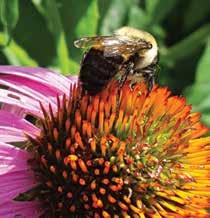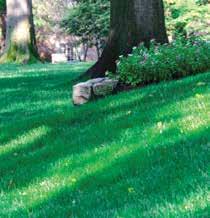
5 minute read
Ask the Experts
Note: My questions this month will follow a theme. I call this theme ‘I Have a Bone to Pick with Dennis.’ I greatly appreciate all the feedback I receive. It is one reason I like to write, knowing people read, follow and sometimes challenge my ideas. As you may know, I can be tongue-in-cheek, which is sometimes not always well received. So, whether you agree or not, here I go. Feel free to give me your feedback again!
HOW CAN YOU RECOMMEND INVASIVE PLANTS
Question: I see you frequently recommend plants that are considered invasive, such as butterfly bush or vinca. Why do you do this?
Answer: Invasive plants become an issue when they escape from our gardens. Many invasive plants are native to Asia, where the growing conditions are similar to the continental United States. My goal is to not recommend plants that can escape from the garden and negatively impact our native areas.
What is considered an invasive plant depends on its location. Most invasive plants seem to be found along the coast, specifically the Pacific Northwest and New England states. These areas have higher rainfall and better growing conditions than in the Midwest. The likelihood of seed development, germination, and sprouting is often associated with increased rainfall.
Just because a plant is invasive in Seattle or Maine does not mean it will be invasive in the central U.S. I research and check the invasive alerts. I am more interested in what is popping up in Midwest states with similar conditions than on the coasts. Hope that makes sense. The problem is we often don’t know what is invasive until the proverbial cat is out of the bag.
WHERE IS YOUR ENTHUSIASM FOR THE USE OF NATIVES
Question: Everyone knows native plants provide many benefits
This bumblebee does not care if the chemical to kill is organic.
over exotics from other parts of the world. I feel like you have not fully jumped on the native bandwagon. I wish you would write more and promote the use of native plants.
Answer: I am on the bandwagon, but you are probably right; I am not the leader of the band. I fully support the use of native plants as they are the lifeline for our local flora and fauna. In fact, my personal goal is to get my own garden to 30 percent or more native plants. Doug Tallamy, the author of Bringing Nature Home, indicates that is what it takes to start supporting native populations.
I have taken a more cautious approach in my writing for this reason. Some are players in the band. Then there are those thinking this is not the wagon to hitch to as natives are weeds. I attempt to strike a balance. My goal is to demonstrate it is not an all or nothing idea. You can still have pretty hostas and you can have natives. Some people need to slowly warm up to the idea that a native garden is not a weed patch but can bring beauty and enjoyment. Then they will join the band and together we can make beautiful music.
ANIMAL RELOCATION NOT A GOOD IDEA
Question: I read recently that you recommended to kill the squirrels and rabbits instead of relocating them to a new home. How cruel are you?
A thriving lawn is beneficial to the environment and people.

Answer: K-State Research and Extension Wildlife Specialists have shown me the data of what happens to animals that are lived-trapped and relocated. The result is almost all the relocated animals die within weeks of capture and release. Studies show often is a slow inhuman death dying from starvation, lack of water or protection. With the animal out of sight and mind, we have visions of the cute fluffy animal frolicking with new friends and having a good life. That is not true.
Research has shown a more humane death is less stressful and less cruel on the animal. My honest take is if you cannot bear to put an animal down, then learn to live with it. In most cases, if you trap one, then another one will move in. (Side note… I am writing this at my kitchen table as three squirrels are having a party on my birdfeeder!)
CHEMICALS AS A LAST RESORT
Question: Why do you always recommend chemicals to control pests instead of organic methods?
Answer: Actually, I talk more people out of applying pesticides than using them to treat an issue. The truth be told, organic insecticides, just like chemicals, can kill beneficial insects. Even though the label says organic, most people don’t realize they are probably just as bad for bees and butterflies. Letting nature run its course is usually the best approach.
When it comes to herbicides for weeds, it would be wonderful to have an organic product that really works. I know there are natural products, but they usually only affect young, tender annuals. There is not an organic product that will have any effect on bindweed or poison ivy.
My recommendation always has been and always will be to use pesticides, chemical or organic treatments as a last resort, and to be more tolerant as perfect plants only exist in our dream gardens.
THRIVING LAWN VS LAWN WARRIORS
Question: Why are you so in love with high input and maintenance lawns. Don’t you know how much water, fertilizer, and pesticides they use that are bad for the environment?
Answer: I would not say I am in love with high maintenance lawns. What I would say is I am in love with proper lawn care. What chaps my hide is when I see water wasted, fertilizer spread into the streets, grass scalped after mowing, or treatments applied at the wrong time. As I drive around, I often shake my head when I see ‘lawn warriors’ wasting so many valuable resources. I ask myself, why? Why are they doing this?
My take is this: everyone can have a thriving lawn. That may include a few weeds, patchy coloration, and other imperfections. Lawns are essential as they absorb heat, cool our cities, absorb carbon, and release oxygen. They are vital after a rain in slowing water movement, reducing flash flooding, and preventing soil erosion. Washing soil clogs our waterways and moves harmful pesticides and needed nutrients into the water, compromising quality. I am pro lawns but healthy turf (ground covers), protecting our soil and providing a surface for family enjoyment. I never said your lawn should resemble a golf course.
DENNIS PATTON Horticulture Agent
Dennis Patton is the horticulture agent for Johnson County K-State Research and Extension. For free information fact sheets, visit www.johnson.ksu.edu, or call the Extension office at 913-715-7000.








